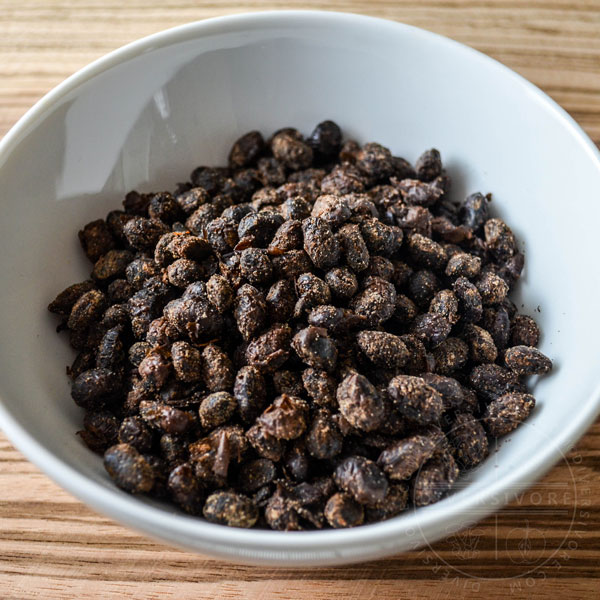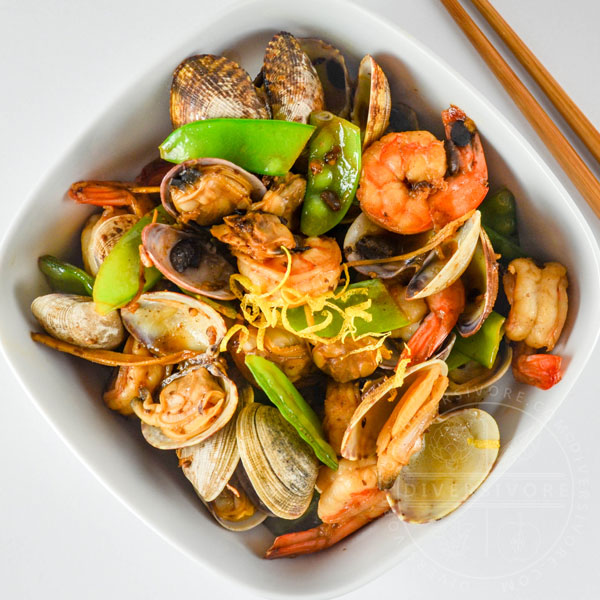Diversivore Guide to
Douchi
(Chinese Black Beans)

Share this Guide
The Basics
What Are They?
Douchi are salted and fermented black soy beans, found in many East Asian cuisines but most common in the food and cooking of China.
What are they used for?
Used as a condiment, or as the basis for sauces, these strong, salty, fermented beans contribute a great deal of distinctive flavour to variety of dishes.
Flavour Profile
Green/Sweet/Bitter; generally mild with a slight mustard-green flavour
Other Names
English: Fermented black beans, black beans (see FAQ below)
Chinese: 豆豉 - dòuchǐ (Mandarin), dau si (Cantonese)
Japanese: daitokuji natto, hamanatto
Cebuan & Tagalog: tausi
Chinese Black Bean FAQs
Are Chinese black beans the same as Mexican black beans?
No, not at all. The black beans popular in Central America, South America, and the Caribbean are black turtle beans (Phaseolus vulgaris), and are cooked and eaten as-is. Chinese black beans are black soybeans (Glycine max), and are fermented and heavily salted. The two are completely different, and absolutely do not substitute for one another.
Are Chinese black beans the same as black bean sauce?
No - the former is a base ingredient, while the latter is a finished sauce/recipe. Chinese black bean sauce is primarily made with douchi (fermented black beans), but a number of other ingredients are used as well (notably garlic and soy sauce). As such, black bean sauce has a more complex, less intense flavour than the plain beans alone.
Are Chinese Black Beans Fermented?
Yes! They owe their distinctive and powerful flavour to the fermentation process. Before fermenting, black soy beans have a far milder and more typically legume-like flavour.
How do you say 'douchi'?
Douchi is a Mandarin Chinese word, roughly pronounced DOH-chi, with an i like the one in the word ‘shirt.’
How-To
Find
Douchi are generally easy to find at well-stocked Chinese grocery stores, though not as easy as black bean sauces. Look for them in small plastic packages. They can also be found at online retailers specializing in Chinese ingredients
Choose
Look for something packaged recently, with only soybeans (or black soybeans), salt, and possibly ginger listed as ingredients. Douchi packaged in small plastic bags are going to be the most intensely flavoured. They are occasionally found in small glass jars as well, though these are often less flavourful.
Prep
Difficulty: Easy - Preparation varies depending on the recipe, but generally involves soaking the beans in a few changes of cold water to reduce their intense saltiness.
Use
Douchi are used as (or as part of) a condiment or sauce in a variety of dishes. While they are beans, their intense flavour and high salt content preclude using them like conventional dried/canned beans.
Store
Store in a tightly sealed container or resealable bag in the refrigerator. They will keep for several months if stored properly.
Culinary Info
Flavour Profile
Salty/Pungent/Fermented/Sharp - Douchi have an intense and distinctive flavour, though it's fairly unique and difficult to describe. The flavour will be familiar to anyone who's tried a black bean sauce at a Chinese restaurant, as douchi are the primary ingredient.
Substitutions
Nothing can really substitute for douchi, but good Chinese black bean sauce (which is made from douchi) can stand in for them in many recipes. Note that Central/South American black beans are NOT the same thing at all! See Substitution Notes below for more information.
Cuisines
Douchi are most famous for their use in Chinese cooking, but they also make appearances in other East and Southeast Asian cuisines, especially in finished sauces.
Flavour Pairings
Douchi have a highly distinctive and intense flavour that's frequently paired with soy sauce, ginger, garlic, chilies, and sugar. Their powerful flavour is popular with leafy greens, and bitter vegetables (e.g. bitter melon). Strong but contrasting sweet and sour flavours like citrus make excellent flavour pairings as well. A variety of meats can be prepared with douchi, but white fish, chicken feet, and spare ribs are particularly popular.
Varieties
Douchi are a fairly uniform ingredient, though there is some variation in their preparation. Most notably, some varieties are made with ginger, while others are not. The overall base flavour of the beans is the strongest aspect regardless, but the presence or absence of ginger is still noticeable. There are also some douchi varieties made with other soybean types, though these are often given different names (e.g. mianchi).
More Info
Nutrition
Douchi aren't used in quantity the way many other soybean products are, so their contribution to the nutritional profile of a dish is generally small... EXCEPT for their salt content. Douchi have a LOT of salt - 100 g, unwashed, can have upwards of 4000 mg of sodium, or nearly double the daily recommended maximum intake. That being said, a) that's a lot of douchi, and b) when prepared properly, a LOT of that salt should be washed out. They'll still contribute a fair bit of salt to a dish, but it shouldn't be overwhelming.
GMO Status
Soybeans are one of the most common genetically modified crops on the planet - however, black soybeans have not (as of 2019) been subject to any genetic modification or engineering.
Health & Science
- Douchi are fermented by inoculation with a type of Aspergillus fungus (the exact type is somewhat debated). This genus of fungus is especially important in Asian cooking, as they are used to ferment soy sauce, miso, sake, rice vinegar, and other foods.
- Douchi, like most fermented soybean products, contain a fairly high levels of histamine. This can be problematic for people with histamine intolerance.Organic vs. Conventional
Both organic and conventionally grown black soybeans are grown, and douchi can be produced with either. Organic douchi are increasingly common and popular, and are generally clearly advertised as such. Taiwan seems to be producing a fair number of organic black soybean products, and online availability is generally fairly good.
Share this Guide


